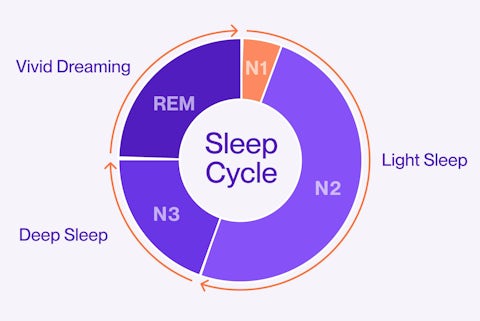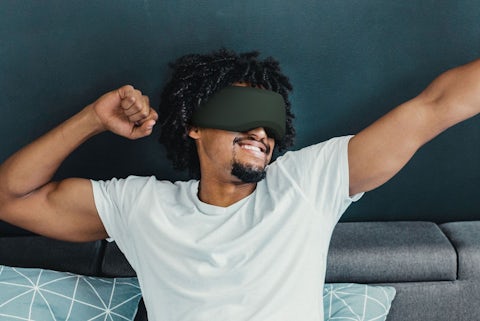How to Fall Asleep Faster: 5 Tips & Tricks
 Andrew Jolie February 27, 2024 12 min read
Andrew Jolie February 27, 2024 12 min read
We all know that sleep is crucial for maintaining optimal health. Yet for many, amidst the hustle and bustle of life, falling asleep can often be a real struggle. Whether it's due to stress, an overactive mind, or other factors, the frustrating inability to drift off can disrupt our daily lives and adversely affect our wellbeing. Recognizing the importance of a good night's sleep, we've curated five of our best tips and tricks to help you overcome those restless nights and fall asleep faster. From relaxation techniques to creating the ideal sleep environment, we're here to guide you towards better sleep habits and improved overall health. Say goodbye to tossing and turning, and hello to restful nights ahead.
How Long Should It Take to Fall Asleep?
Most adults with good sleep hygiene tend to take around 15 to 20 minutes to drift off.
According to the U.S. National Library of Medicine, it shouldn't take you more than half an hour to fall asleep. If you regularly find yourself staring at your ceiling for much longer than this, you may have a sleep disorder, such as insomnia. However, there are many other factors that may be affecting your sleep, and ways in which you can help yourself fall asleep easier and quickly.
Are there any special ways or techniques to help falling asleep?
Do you often find yourself wide awake at night, wishing your mind had an on and off switch? We know the feeling. Fortunately there are steps you can take and techniques you can try in order to make your journey to dreamland a bit smoother. Over the years, countless individuals grappling with insomnia or restlessness have discovered various approaches that can gently guide the mind and body into a state of relaxation. From mindfulness practices, to simply adjusting your environment and routine, there are many strategies to choose from, which we have outlined below.
5 Tips & Tricks to Fall Asleep Quickly
Sleepless nights can be a true struggle, leaving you feeling restless and drained the next day. To help you enhance your sleep hygiene and enjoy more restful nights, we've compiled a list of 5 tried-and-true tips and tricks to help you fall asleep quickly. We suggest trialing a few and seeing which methods resonate most with you and your sleep needs. Once you've found the technique or blend of approaches that work best for you, you'll be pleasantly surprised at how quickly you'll be dozing off and waking up feeling refreshed, ready to tackle the day ahead with renewed energy and vigor.
Tip 1 - The Military Sleep Method
During the past couple of years, ‘The Military Sleep Method’ has become a trending topic in mainstream media and on TikTok, however it was first developed during the second world war. Navy pilots were becoming extremely fatigued, causing them to make fatal mistakes. A sports coach, Bud Winter, was assigned to solve this issue and in turn he trained them to fall asleep extremely quickly, whenever needed, using a relaxation method. The (method) worked so well that they were able to drift off whilst sitting up with loud and distressing sounds around them. Winter later included the specific technique in his 1981 book ‘Relax and Win’. The method supposedly takes around six weeks to master, however it could be worth it as Winter claimed it has a 96 percent success rate of helping individuals to fall asleep in just 2 minutes. Are you intrigued to try? We don’t blame you! Here is an outline for you to give it a go:
The Military Sleep Method: A Step By Step Guide
Step 1: Get into bed and get as comfortable as you can. Close your eyes and begin to take slow, deep breaths.
Step 2: Relax your face, focusing on one area at a time. Start with your forehead and slowly start to move down to your cheeks, your mouth and your jaw. Don’t forget to relax your tongue, and make sure it’s released from the roof of your mouth. It’s important to relax each and every muscle.
Step 3: Now, start to relax the rest of your body. Start by dropping your shoulders, and work your way down to each arm (focusing on one at a time). Move down to your hands and relax each finger one by one. Work your way down to your chest and abdomen and, followed by each leg, your feet, and your toes. Allow yourself to completely sink into the bed.
Step 4: Now it’s time to clear your mind. Picture yourself in a peaceful location, such as lying in a hammock in a pitch black room or on a sandy beach. The key thing here is to avoid thinking of any movement. If the visualization fails to switch your brain off, say the words “don’t think” repeatedly in your mind for ten seconds.
Practice this every night for six weeks, and you should begin to fall asleep extremely quickly, in under two minutes to be precise.
Tip 2 - Muscle Relaxation & Breathing Techniques
The military sleep method utilizes both muscle relaxation and deep breathing which is what makes it so effective. Deep breathing helps to calm the nervous system and causes your heart rate to slow down. It has also been shown to trigger the production of melatonin - an essential sleep inducing hormone. There are many other breathing and relaxation techniques you can try. It is particularly calming to exhale for longer than you inhale. The 478 method is a prime example of this that you can try to help you fall asleep faster. Here’s how to practice it:
The 4-7-8 Breathing Method For Sleep:
Step 1: Begin by getting as comfortable and relaxed as possible. Inhale through your nose for 4 seconds.
Step 2: Hold your breath for the count of 7.
Step 3: Gently part your lips and exhale deeply, whilst making a ‘whoosh’ sound. Allow the exhale to last for 8 seconds.
Repeat 4 times if you are new to breathing exercises, but you should practice this regularly and try to build up to a repetition of 8 times. This breathing exercise is also highly beneficial in the daytime to reduce anxiety.
Tip 3 - Peaceful Music or Sleep Meditation
Listening to relaxing music at bedtime is a great way to switch your brain off and stop your wandering mind. Research indicates that music has the potential to lower cortisol levels, a stress hormone in the body. It also stimulates the release of dopamine, which can enhance positive emotions before bedtime and potentially alleviate pain. Similarly, guided sleep meditations can help you to let go of any anxieties you may have and can help your body come to a completely relaxed state, helping you to drift off. You can find a wide array of sleep music and meditations online, designed to ease your mind and calm your body.
Tip 4 - Enhance Your Sleep Routine and Environment
Stick to a regular routine when possible
Establishing a consistent sleep routine can work wonders in regulating your body's internal clock and promoting better sleep. Try to stick to a regular bedtime and wake-up time, even on weekends, to help synchronize your sleep-wake cycle. This consistency signals to your body when it's time to wind down and when it's time to rise, making it easier to fall asleep and wake up feeling refreshed.
Digital detox
Incorporating a digital detox into your pre-bedtime routine can significantly improve sleep quality. The blue light emitted by screens can disrupt the production of melatonin, the hormone responsible for regulating sleep, making it harder to fall asleep. Instead of scrolling through your phone or watching TV before bed, opt for activities that promote relaxation, such as reading a book or practicing gentle yoga.
Avoid Caffeine after 12pm and reduce alcohol intake
Being mindful of your caffeine and alcohol intake can also play a significant role in improving sleep. Caffeine is a stimulant that can interfere with sleep, so it's best to avoid consuming caffeinated drinks after noon or limit your intake altogether, especially in the hours leading up to bedtime. Similarly, while alcohol may initially make you feel drowsy, it can disrupt your sleep cycle, leading to fragmented and less restorative sleep. Limiting alcohol consumption, particularly in the evening, can help improve the quality of your sleep.
Opt for a comfortable sleep environment
Creating a comfortable sleep environment is additionally important for enhancing sleep quality and helping you to drift off quickly. Your bedroom should be a sanctuary for sleep, free of distractions and conducive to relaxation. Keep the room dark, quiet, and comfortably cool, as a cooler and darker environment can help to release more melatonin, signaling to your body that it's time to sleep. An ideal bedroom temperature is around 65°F (18°C). Investing in a comfortable mattress, pillows, and bedding can also make a world of difference in ensuring a restful night's sleep.
Follow the 10-3-2-1 Rule
The 10-3-2-1 rule is a simple yet effective guideline designed to help you sleep better by gradually winding down before bedtime.
- 10 hours before you plan to sleep, the rule suggests avoiding caffeine consumption.
- 3 hours before bedtime, it advises refraining from consuming heavy meals or engaging in intense physical activity, allowing your body to begin the digestion process and wind down.
- 2 hours before bed, the recommendation is to stop all work-related activities and electronic device usage, reducing exposure to blue light that can disrupt melatonin production and sleep.
- Finally, 1 hour before bedtime, it encourages engaging in relaxing activities such as reading, meditating, or taking a warm bath to signal to your body that it's time to prepare for sleep.
Tip 5 - Use a Sleep Mask
As previously mentioned, darkness is essential for a high quality sleep. This is due to the way in which your body has a natural 24 hour cycle that controls the release of the sleep hormone, melatonin, at night and the wake hormone, cortisol, in the morning. This cycle is called your Circadian Rhythm and is influenced by the rise and the fall of the sun. In today’s technology dominated society, our circadian rhythm is constantly being tricked into thinking that it's still daytime, due to the pervasive use of phones, laptops, and other electronic devices emitting blue light, which suppresses the production of melatonin. This is a huge factor as to why many of us struggle to fall asleep at night. By weaning a sleep mask, you can block out any distractions and any elements of light that may trickle into the bedroom.
Bía is a 100% blackout sleep mask that helps to release melatonin at night, helping you to fall asleep much faster. What’s more is that in the morning, the mask emits a slow illumination of light, mimicking the sunrise, which helps you to wake up feeling much more refreshed. In short, with Bía Sleep, you can shift your circadian rhythm directly, on your own terms.
But what makes Bía even more special? Bía Sleep encourages your brain to transition and stay in a desired sleep state using Neurofeedback and neural music. This gentle guidance trains your mind to enter each sleep state faster.
“We like to think of Bía Sleep as your personal sleep coach. It works while you're sleeping, training your brain how to fall asleep faster, achieve more deep sleep, and wake up optimally.” - Michael Byrne Co-Founder & CEO of Bía.
With Bía you can have a great night, every night. To find out more about how the product works head to www.getbia.com, where you can also shop today. Get ready to unlock the power of a restful sleep.
FAQs about falling asleep fast:
What is the best way to fall asleep very quickly?
The best way to fall asleep quickly is to establish a relaxing bedtime routine. This may include activities such as reading a book, taking a warm bath, or practicing relaxation techniques like deep breathing or meditation. Additionally, ensuring your sleep environment is conducive to rest by keeping it dark, quiet, and comfortably cool can help promote faster sleep onset.
What is the fastest way to fall asleep?
While there's no guaranteed method to fall asleep instantly, some people find that using relaxation techniques such as progressive muscle relaxation or visualization can help them drift off faster. Creating a consistent sleep schedule and optimizing your sleep environment can also contribute to faster sleep onset.
Is it possible to fall asleep in 5 minutes?
Falling asleep in 5 minutes is not typical for most people, but it can be achievable for some individuals who are extremely tired or have developed effective relaxation techniques.
Is it possible to fall asleep in 2 minutes?
Some techniques claim to help individuals fall asleep in 2 minutes, such as the military method or the 4-7-8 breathing technique. However, achieving this level of rapid sleep onset may be challenging for many people and it often requires practice and consistency with relaxation methods.
Is it possible to fall asleep in seconds?
Falling asleep in a matter of seconds is highly unlikely for most individuals. While some people may experience a sudden transition from wakefulness to sleep, especially if they are extremely exhausted, this is not typical for the majority of people. If you find yourself regularly falling asleep in seconds, it may indicate that you are overly exhausted or potentially experiencing a sleep disorder, such as narcolepsy or sleep apnea.
What is the golden rule of sleep?
The golden rule of sleep is to prioritize consistency in your sleep schedule. This involves going to bed and waking up at the same time every day, even on weekends. Consistency helps regulate your body's internal clock, promoting better sleep quality and overall well-being. Blocking out any light around bedtime is also vital for your circadian rhythm and to help you fall asleep quickly every night. Wearing a blackout sleep mask is a practical and effective way to do so.
What is the 10 3 2 1 0 rule for sleep?
The 10-3-2-1 rule is a helpful guideline for improving sleep quality and helping you to fall asleep more quickly. The rule suggests refraining from caffeine consumption ten hours before bedtime, avoiding heavy meals and intense activities three hours before bed, cutting out screen time two hours prior, and engaging in relaxing activities one hour before sleep. This gradual wind-down routine helps signal to the body that it's time to relax, promoting a more restful night's sleep.
If you still have trouble falling asleep after trying these suggested changes and techniques, please consider consulting a healthcare professional.


